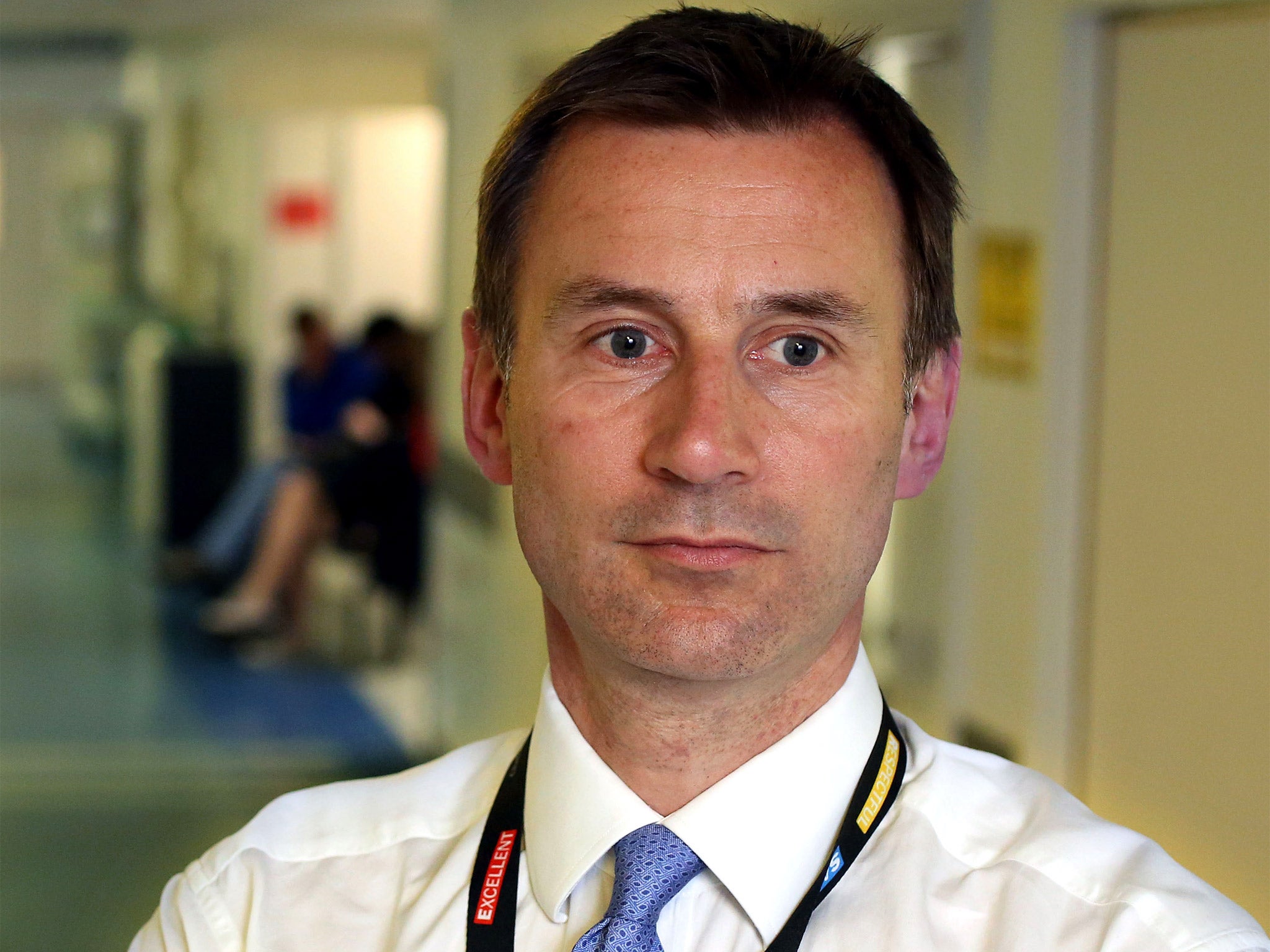It won’t work, Jeremy: The Health Secretary has lost the confidence of the medical profession in his attempt to reform the NHS

Your support helps us to tell the story
From reproductive rights to climate change to Big Tech, The Independent is on the ground when the story is developing. Whether it's investigating the financials of Elon Musk's pro-Trump PAC or producing our latest documentary, 'The A Word', which shines a light on the American women fighting for reproductive rights, we know how important it is to parse out the facts from the messaging.
At such a critical moment in US history, we need reporters on the ground. Your donation allows us to keep sending journalists to speak to both sides of the story.
The Independent is trusted by Americans across the entire political spectrum. And unlike many other quality news outlets, we choose not to lock Americans out of our reporting and analysis with paywalls. We believe quality journalism should be available to everyone, paid for by those who can afford it.
Your support makes all the difference.The Health Secretary, Jeremy Hunt, can expect another disturbed weekend unless he switches off his smartphone. He has managed to antagonise doctors so significantly over his plans to implement a seven-day working week that it inspired a social media campaign against him.
A simple glance at the comments (to be found, if you wish, by following #imatworkjeremy or #weneedtotalkaboutjeremy) serves to remind of both the dedication of the NHS workforce and its utter fury at the Government.
In response, Labour leadership hopeful Andy Burnham has promised to table a vote of no confidence in Mr Hunt if elected. That is, of course, just a political stunt – the feud between the two men goes back to 2013 when Mr Burnham threatened his counterpart in government with legal action over comments made about his own record in the job – but it is no less significant for what it indicates. Mr Hunt’s position is becoming untenable, yet he finds himself in that precarious situation through no fault but his own.
The Department of Health’s ambition to modernise the NHS and have all departments working seven days a week is shared by doctors and by the electorate. Where there is a clear, if relatively minor, difference of opinion, is over the resourcing of this change and the best way to make sure doctors – already no strangers to the 50-hour week – do not end up working longer than is safe for patients, and for their own well-being. This is a gap, not a chasm; it could, with care, be bridged.
Mr Hunt’s position appears to have been misunderstood by doctors. In addressing the profession he acknowledged their hard work, and accepted that there are thousands already working every weekend. And he has stated that his reforms are “not about increasing the total number of hours worked every week by any individual doctor”. But he came undone by what followed next. His call for the British Medical Association, considered by doctors as a personal advocate, to “get real” was poorly advised and widely interpreted as a personal attack on frontline staff. His claim that 6,000 deaths a year are the result of a five-day system is disputed by academic research and angered the profession further.
Yes, the promise of a seven-day health service was a Conservative manifesto commitment, and Mr Hunt and his cabinet colleagues will do all they can to see it implemented. The Health Secretary is already moving to push his plans through regardless of opposition; he will forcibly impose a new contract on the BMA if it does not co-operate in further negotiations.
But, despite doctors and the Government agreeing almost entirely on where the NHS should end up, Mr Hunt’s bullish approach means that they are now further than ever from a constructive discussion leading to a deal which benefits all – doctors, patients and the Tories.
The case has echoes of the breakdown of relations between former Education Secretary Michael Gove and the nation’s teachers. Though the reforms Mr Gove intended to implement had a far wider impact, the result of their poor handling was the same: the loss of trust among the profession he served – and the Secretary of State is, after all, a public servant – meant that Mr Gove eventually had to be moved on.
The deadline for the Government to negotiate a contract with the BMA, which sets the terms and conditions for doctors on their behalf, is just weeks away. If Mr Hunt cannot adopt a more conciliatory approach and recover his position within a matter of days, he may find he faces a similar fate. The job of modernising, and properly funding, the NHS is too important to leave to one individual who has lost the confidence of the experts to which the service’s day-to-day operation is entrusted.
Join our commenting forum
Join thought-provoking conversations, follow other Independent readers and see their replies
Comments